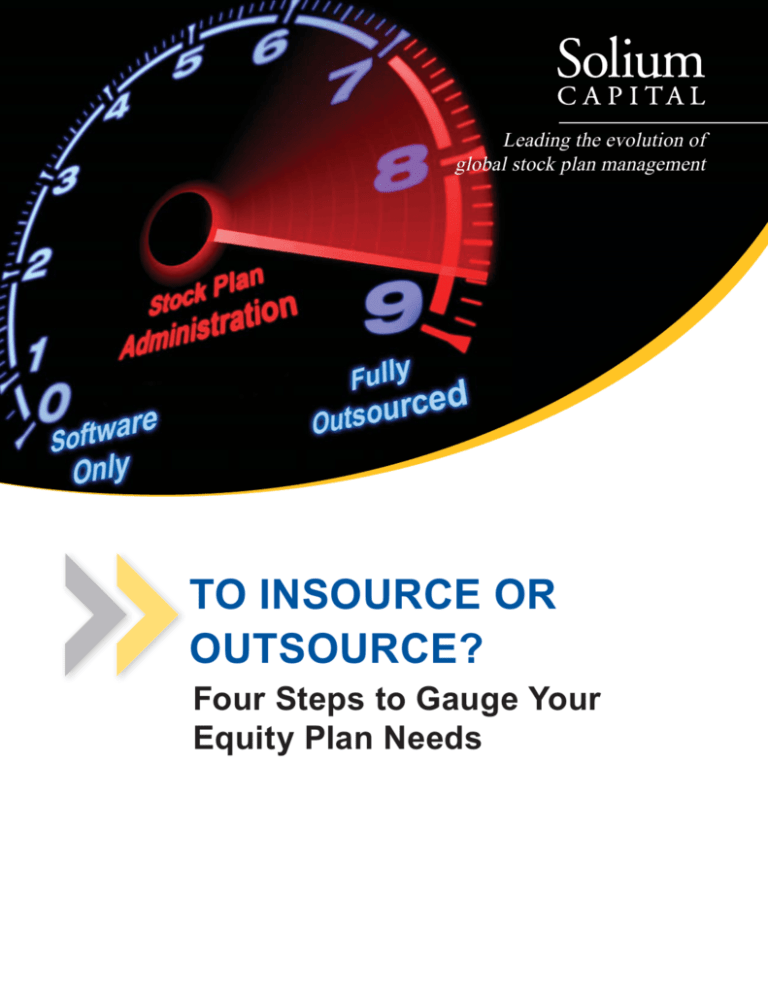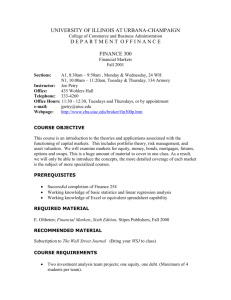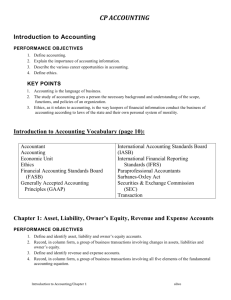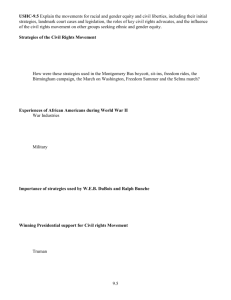
Leading the evolution of
global stock plan management
TO INSOURCE OR
OUTSOURCE?
Four Steps to Gauge Your
Equity Plan Needs
TO INSOURCE OR OUTSOURCE?
FOUR STEPS TO GAUGE YOUR EQUITY PLAN NEEDS
Administering employee equity plans can be a tricky business. Keeping up with complex and ever-changing
compliance requirements while managing efficient processes with limited resources can be an overwhelming
responsibility for anyone. And determining the resources you need to administer your employee equity plan can
be confusing as well, given the wealth of options that exist.
Deciding how much of your stock plan administration to outsource is a major undertaking. Some companies
like their staff to manage everything in-house using recordkeeping software and a broker partner. Others prefer
to fully outsource the administrative tasks to a third party who provides the recordkeeping system, handles the
trading and offers knowledgeable stock plan experts to manage the program. The most suitable method for you
depends on a number of factors – there’s no right or wrong answer. This white paper will guide you through a few
points to consider when making this assessment.
STEP 1 – ASSESS YOUR TECHNOLOGY – AND THEIRS
Because the factors in the decision are largely interdependent, determining what degree of outsourcing is right
for you will not be a linear process. But a good place to start your assessment is with technology, which provides
the foundation for a successful administration infrastructure. A stock plan recordkeeping system is essential for
tracking various plan terms, participant activities, demographic information (e.g., ID numbers, addresses and hire
dates), grants and awards, and other related data. The system also houses information about transactions, such
as option exercises, restricted stock releases and acquisitions from share purchase programs. Reports from
the system are necessary for accurate financial reporting and accounting, and the company can also use the
platform to track share-pool balances and behavioral trends.
You should address the following major questions when deciding on stock plan software:
Does the system have the functionality required to support your equity plans?
Most available programs will support standard equity vehicles, transactions and reports. If your plan
has unique terms, such as market-based performance vesting, or if you want the flexibility to generate
fully customized real-time reports, you might need a more specialized application. If you can’t find
a system to handle these requirements, you’ll need to look for a gap solution or build a manual
workaround.
How does the software interact with other systems involved in the workflow?
If you want to connect the stock plan software to your HR system, the broker’s trading platform, a
participant web portal or your payroll provider, think about what data needs to be exchanged and how
this will be accomplished. Integrating multiple technology platforms enables data integrity and efficient
data movement while minimizing risk associated with human error.
Do you want to be responsible for maintaining the system?
If you like having full control of the database and don’t mind handling all the data entry, storing the
system at your site may be best. But if you want to avoid licensing issues and software upgrades and
simply want to run reports from the system, a third-party outsourcer may be optimal.
2
Four Steps to Gauge Your Equity Plan Needs
How much time will the proposed technology save you?
Look at how the system can automate tasks that you would otherwise
perform manually. Make sure to consider not just the core recordkeeping
platform, but connected interfaces (e.g., participant web portal) that could
save a great deal of your time.
Will the system grow with your company?
As your company matures and the characteristics of your employee base
change, your equity plan will evolve. The system should be adequately
flexible and robust to support evolution. Ideally, you should be able to
move from in-house administration to outsourcing on the same system.
Your answers to these questions may help you narrow down the wealth of
software choices. Some systems are available as part of a software-only, in-house
administration solution while others are only offered in an outsourcing relationship
with that particular provider. Once you know how you want to manage your
technology platform, you are one step closer to finding the right administration
structure for your company.
Bottom line – Understand what you need a recordkeeping system to do
and how you want to interact with it.
STEP 2 – ASSESS YOUR HUMAN CAPITAL
No matter what structure you choose, the people managing your equity plans must
be knowledgeable. With a software-only, in-house arrangement, you’ll need people
with expertise to handle a wide variety of tasks.
If you are considering this route, ask yourself the following questions:
Who will be responsible for managing each function?
Are these employees dedicated to stock plan administration or do their
core responsibilities lay elsewhere, such as payroll or HR?
Do you have enough people to handle the inevitable volume of work that
comes at year-end or during a stock price spike? What about coverage
for absences? If you have one person responsible for stock plan
administration, who audits his or her work?
Does your team have sufficiently broad knowledge to handle the demands
of your plan and the needs of your participants? For example, if you grant
internationally, how well do you understand equity plan requirements in
the countries where you operate?
3
Four Steps to Gauge Your Equity Plan Needs
If you have adequate internal stock plan expertise, in-house administration may be
viable. If not, an outsourcing relationship could be beneficial, as you can draw on
the provider’s staff to provide critical expertise and continuous, scalable coverage
regardless of high volume and employee turnover.
Bottom line – Your capacity to handle a software-only model depends on
the number of people you have staffed to the administration of your plan –
and their level of expertise.
STEP 3 – ASSESS YOUR COMFORT WITH RISK
Employee equity plans come with a great deal of risk, as they are subject to
corporate governance practices and various securities, tax and accounting
regulations. Your employee equity plan will also affect your financial reporting and
involve an accounting expense for your company. When you work with a softwareonly solution, all aspects of managing your equity plans are totally up to you,
including risk management.
Three things can help minimize exposure to risk:
Internal expertise – Those responsible for stock plan administration
should understand regulatory compliance requirements and be able to
provide sound counsel when challenging situations arise. You should
know how you’ll keep up with ever-changing rules and practices and
understand how they affect your equity plan.
Automation – The less your equity data is touched by human hands, the
safer it is. Think carefully about how equity data flows through the cycle
and across multiple platforms, and find a solution that allows as much
automation as possible.
Process design – Well-crafted, standardized processes with audit
controls and consistency of application are also key to a risk mitigation
strategy
Fully outsourcing your stock plan administration can offer peace of mind. You’ll
gain access to stock plan professionals with extensive expertise, sophisticated
technology tools to move and process large amounts of data, and systems built to
streamline tasks. And many service providers have documented practices in place
to offset risk for themselves and their clients, such as a Statement on Standards for
Attestation Engagements (SSAE) No. 16 (formerly known as a SAS 70). A SSAE
16 provides significant information about the provider’s business controls and can
help mitigate your risk.
Bottom line – Expertise, automation and intelligent process design mean
less risk.
4
Four Steps to Gauge Your Equity Plan Needs
STEP 4 – ASSESS YOUR PARTICIPANTS
Ultimately your equity plan exists for your participants, who are most likely your
employees. If the program is too confusing or participants can’t get answers
easily, you may find the plan is not achieving its purpose as a retention, reward
and incentive tool. As you assess your participants, think of the level of support
you want to offer them. Are your people savvy when it comes to employee equity
programs or do they need a bit more assistance? If they need significant support,
are you able to offer it? Fielding questions and performing transactions for
employees can be a time-consuming responsibility, especially for large, high-needs
populations or on days when the share price jumps.
The following are two popular methods for reaching participants:
A web portal where participants can log in anytime, view their outstanding
equity grants, enter transaction requests and access useful documents
A call center that offers knowledgeable representatives, extensive hours
and support in multiple time zones and languages
Outsourcers often provide these resources at no additional cost, providing an easy
way for your employees to ask questions and take advantage of their equity awards.
Because the outsourcer handles administration for you, their web portal and call
center will likely be able to support more than just basic transactional inquiries.
This is a great way to extend your capacity if you don’t have the time or resources
internally to manage this responsibility.
Bottom line – Know the level of support you want to offer your participants
and decide who will provide it.
FINAL THOUGHTS
Deciding how much of your equity plan administration to outsource will likely
provoke valuable discussions about your organization’s culture and values – as
well as our equity plan’s strategic objectives. The only right solution is the one that’s
right for your unique needs. No matter where your needle sits on the gauge, Solium
Capital offers a solution for you. We have a range of products and services to help
you achieve your goals, from software-only, broker-agnostic solutions to full-service
arrangements that include brokerage services and participant interfaces.
5
Four Steps to Gauge Your Equity Plan Needs
ABOUT SOLIUM CAPITAL
Solium is a leading global provider of web-based stock plan administration technology and services.
Shareworks®, our industry-leading software, provides unrivaled, comprehensive regulatory and financial
reporting capabilities, helping companies automate and manage their stock option and purchase plans.
Since our inception in 1999, we have been known
as industry pioneers, always striving to change the
status quo and challenge conventional methods.
We take great pride in being leaders of change and
delivering the most innovative stock plan administration
experience possible for finance and HR professionals,
plan administrators and participants. Solium has offices
in Canada and the United States.
Contact Solium
Toll free: 1.877.380.7793
solutions@solium.com
solium.com
© 2011 Solium Capital Inc. All rights reserved.
eserved. The Solium
um Capital logo
lo and Shareworks are trademarks of Solium
Capital in the U.S. and/or other countries.









